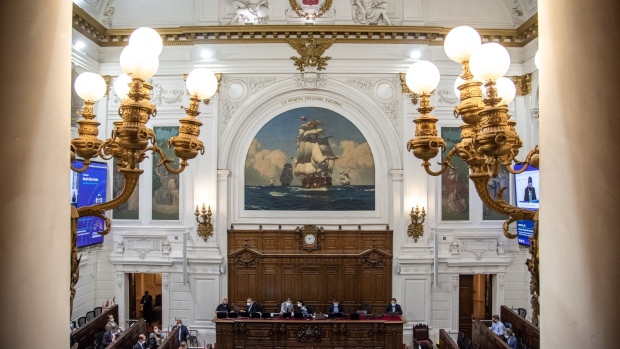May 20, 2022
Chaotic Chile Convention Defies Odds on New Charter, Experts Say
, Bloomberg News

(Bloomberg) -- After months of 18-hour days, radical proposals and growing public disillusionment, Chile’s Constitutional Convention has managed something that some deemed nearly impossible: a “reasonable” document that embraces the nation’s new fervor for social rights without undermining its famously free-market economy, according to experts questioned by Bloomberg.
The Constitutional Convention presented its draft charter Monday, and will now spend the next month fine tuning the wording.
“It’s kind of a miracle that it got this far,” Tom Ginsburg, a professor of international law at the University of Chicago, said in an interview with other constitutional experts. It had an “extremely short drafting timeline, a whole bunch of independents with very radical views and a public without much knowledge in the convention itself. And yet somehow they managed to muddle through.”
The resulting constitution, which will be put to a referendum on Sept. 4. currently has 499 articles, more than double that of the current charter. It will enshrine a number of new social rights, improve environmental protection, decentralize political power and boost autonomy for indigenous groups. Delegates rejected more radical proposals to nationalize Chile’s giant copper industry or ban private companies in the health industry.
“The draft is reasonable,” considering the “very inarticulate, disorganized, ultra individualist type of convention” that drew it up, said Gabriel Negretto, a comparative constitutional law professor at Santiago-based Pontificia Universidad Catolica de Chile.
Yet, the devil will be in the implementation, as the charter restructures the congress and opens the way to a plethora of new institutions including indigenous courts. Neither is there any guarantee that those bodies will bring the greater equality and freedoms many hope.
“Those of us that work with constitutions regularly know that it’s hard to achieve social change through constitutional projects,” said David Landau, a comparative constitutional law professor at Florida State University. “It’s not impossible, but it’s very hard.”
For now though, Chile can pat itself on the back. The political system has successfully channeled the explosion in social rage that threatened to tear the country apart in late 2019, into a peaceful process to reshape a system designed during the dictatorship of August Pinochet 40 years ago. The new constitution will likely create a more responsive political structure, the experts said.
“It’s a much more citizen oriented, participatory text with a stronger role for the state without really changing the parameters of a market economy in any way,” said Negretto.
And it could set the example for other countries. “The one area where it’s truly innovative, that is going to get a lot of attention is the gender parity point,” said University of Chicago’s Ginsburg. “There have been gender quotas in many other constitutions, but nothing like this.”
But before all that can happen, Chileans need to approve the new charter in the referendum.
“If the constitution fails, well, that’s gonna change retrospectively the whole assessment of the process,” Negretto said. “I believe it will be approved. But I do think at the same time that the risks are not negligible of rejection.”
And that would take Chile back to square one.
Other Key Quotes:
- “It’s very easy to make large pronouncements about rights. But when you’re talking about spending the money of the state, that is generally something which is done by the current government based on current resources. The implementation is going to be somewhat of a challenge,” according to Ginsburg
- “To have social rights in the constitution is at this point, kind of like a global thing, particularly if you think about Latin America, you see them essentially everywhere (...) if you look around the world, social rights are very consistent with strong forms of capitalism,” according to Landau
- “Power has been shifted to some degree and the two clearest manifestations of that are the parity norm and the indigenous reserved seats. I think that both will sort of work themselves out reasonably well,” Landau said
- “The Chilean constitution was really behind in terms of social rights and in terms of political rights beyond voting. If you look at the constitutional reforms in the region since the early eighties, you see a gradual, but very consistent expansion of mechanisms of direct citizen participation and the Chilean constitution was immune to that trend,” Negretto said
©2022 Bloomberg L.P.







